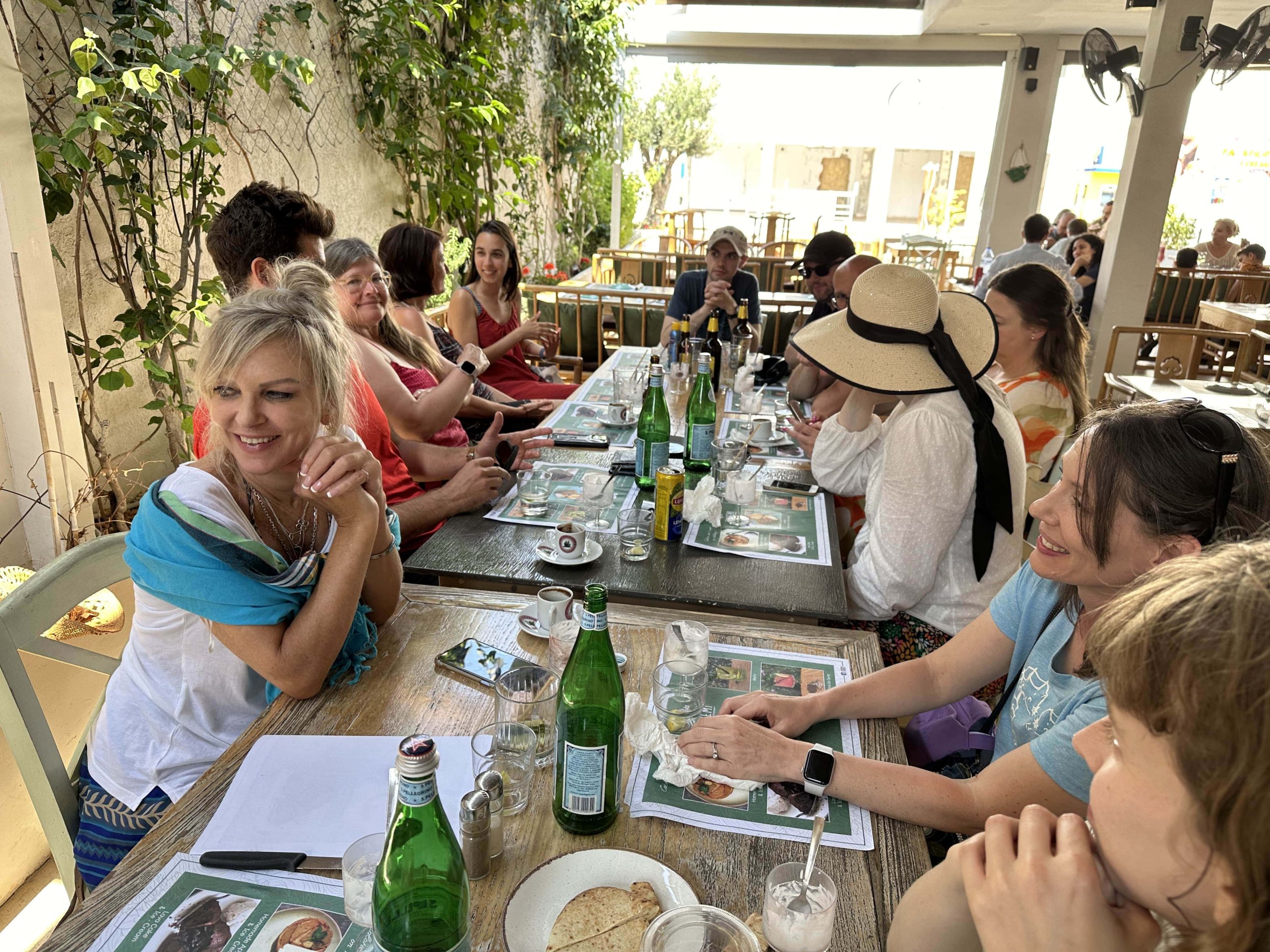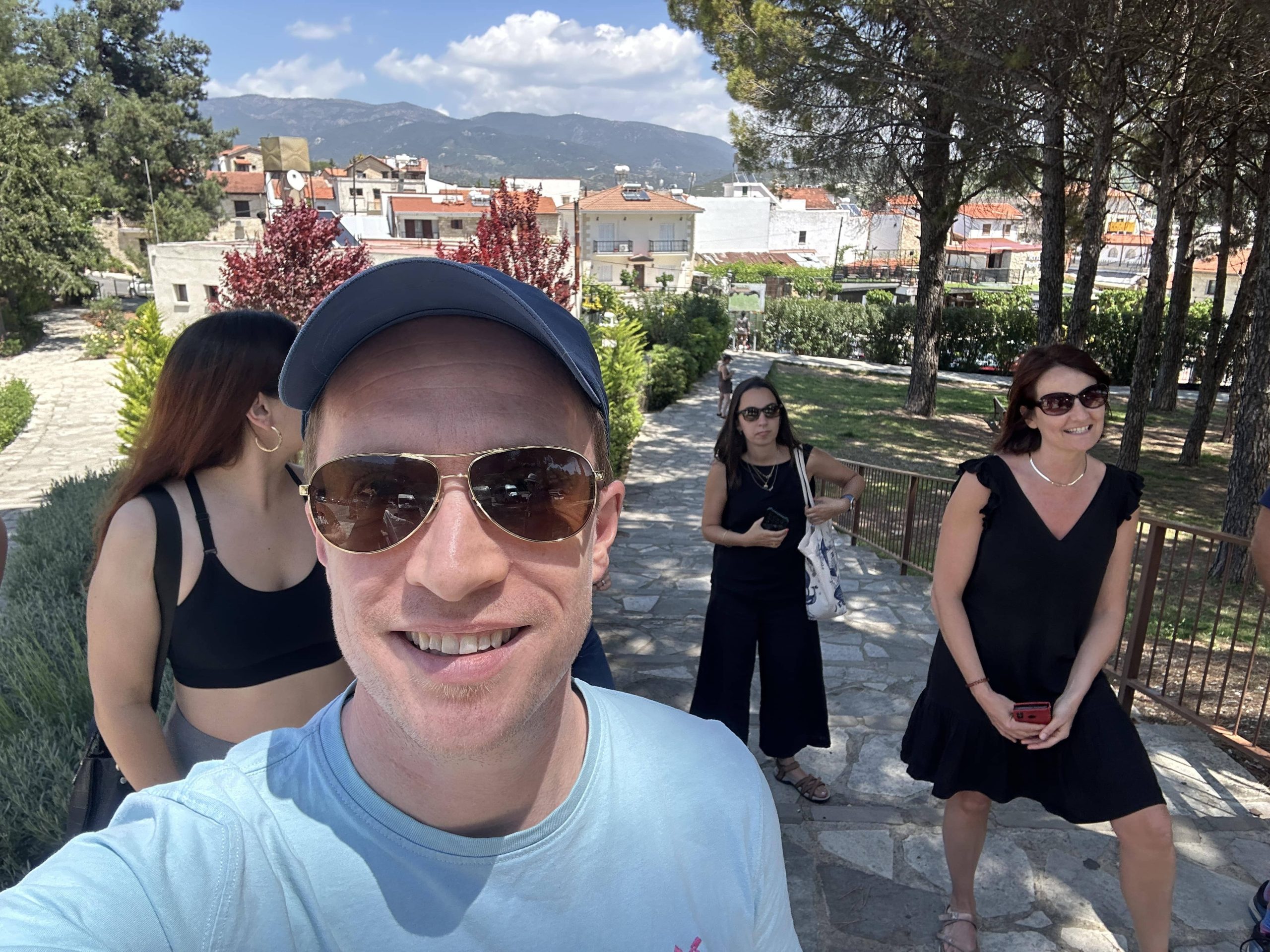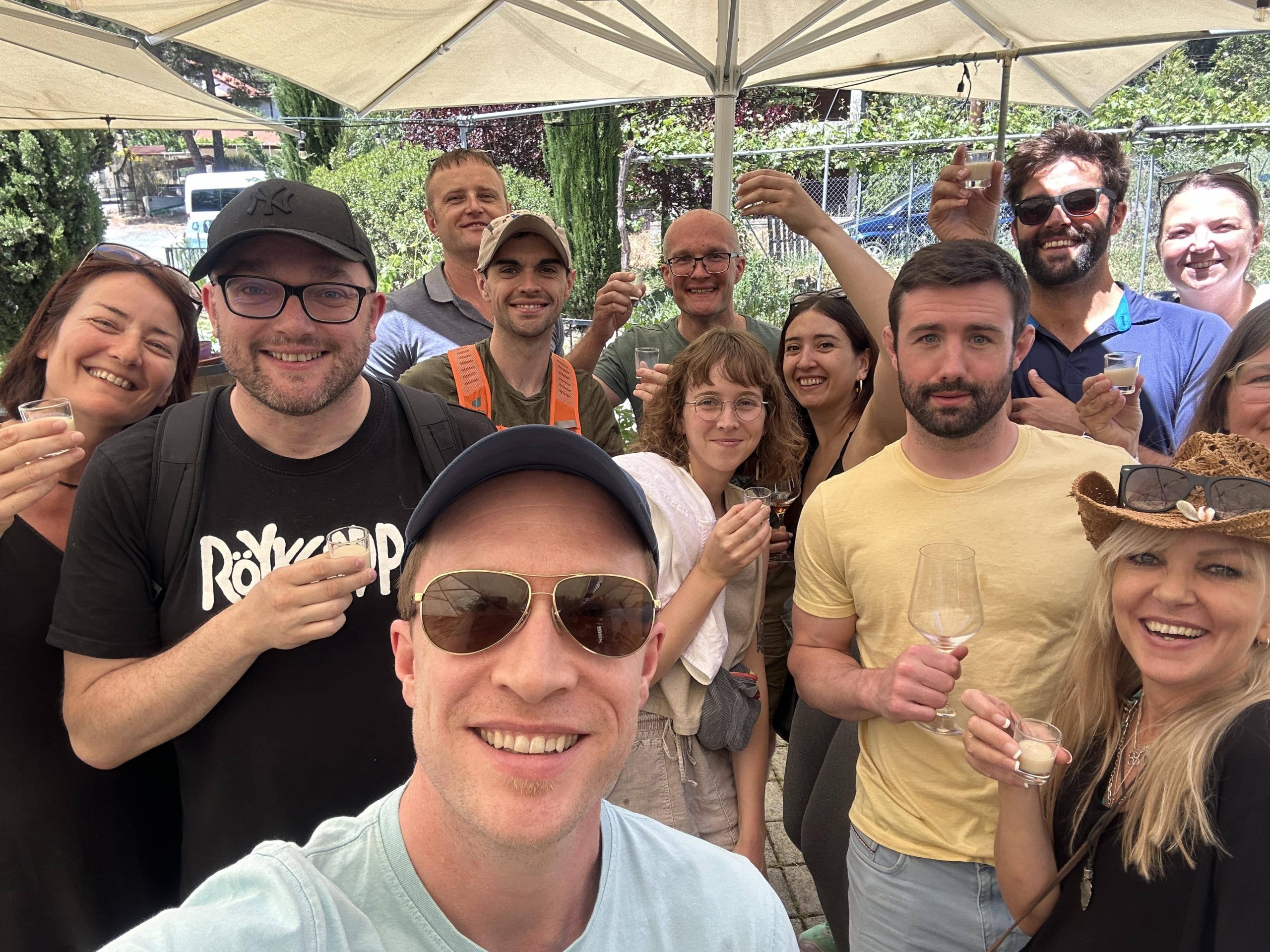Every year, I hold a team retreat for my company, StoryLearning.
We’re a fully-remote team of 16 core staff, spread across the world, from Buenos Aires to California, Johannesburg to Madrid.
But for one magical week a year, we all gather in one place, for a 5-day knees up, which also includes some work.
(Some. Not much.)

After many years of running these, I’ve made every mistake in the book.
Thanks to these mistakes, I’ve ended up with a playbook that I think makes for the perfect team retreat, with a great balance of:
- Work
- Team cohesion
- Fun & adventure
- Future energy

Retreats like this are expensive to run.
So having a good plan helps to makes sure it’s a sound investment – one of the best you can make in the future of your company.
So how’s about I share everything I’ve learnt about running the perfect team retreat?
Cool?
1) “So what do you actually do?”
One of the hardest things in remote team-building is understanding what everyone else in the business does.
I realised this on our very first retreat, when so many comments after the event were:
“I didn’t really understand way so-and-so actually did, but now I get it!”
When people from across your team understand each other’s roles, it creates unlimited scope for collaboration and ideas.
So, I build in dedicated time in the retreat to help people understand each other’s roles:
- department leaders give presentations to the group
- unstructured time to allow people to chat
- brainstorming sessions
For example, set a brainstorming task: “What are all the ways we could double the business?”
Mix up groups of people who don’t normally work together and watch the sparks fly!
2) “Decent” Accommodation Is Enough

Accommodation is always the hardest thing for us to get right. With 16 people, you need 8+ bedrooms… and that’s with people sharing rooms.
In Europe, there are limited villas of this size without getting into the uber-luxury market, which is unaffordable.
As a result, we’ve tried up-market, down-market, and everything in-between.
Here’s what we’ve found:
It’s not the comfort or luxury of the sleeping arrangements that matters (you don’t spend any time there anyway) – it’s the ability for the group to gather in social spaces for meals, conversation, and chilling out that makes it memorable.
At 10pm, when the tequila comes out and the Cards Against Humanity box is opened… it’s the big, open living room that you really appreciate.
Or the big, long table at breakfast.
So, we look for the social elements of the accommodation first and foremost. Provided the bedrooms are comfortable, that’s good enough.
(Pro Tip: Book accommodation 6-9 months in advance so you have the full choice of places on offer. Search on Airbnb first, then try contacting the villa direct through their website for a cheaper price. Google is your friend here.)
3) Great Food Is Everything

One thing I realised pretty quickly is that if you have bad food, everyone’s miserable.
On the flip side, great food really makes the event.
So, while paying extra for the accommodation isn’t always worth it…
The food always is.
In fact, catering often costs us more than the accommodation itself.
I get 2-3 quotes for chefs, and usually go with the most expensive. The best recommendation usually comes from the villa owner, so make sure to ask them.
(Pro Tip: Ask your team for dietary preferences well in advance and take great pains to make sure the catering team understands.
Depending where you go, stuff gets lost in translation. Once, in Morocco, chicken was served to the vegetarians in the group. “Not meat”, apparently. Oops.)
4) Plan No More Than 30% Of Time For Work
It’s tempting to stuff the week full of planned sessions, but we’ve found it best to allocate no more than 30% of the time to scheduled sessions.
The rest of the time should be deliberately left free because that is where the magic happens…
- Spontaneous chats
- 1-to-1s
- Catch-ups
- Walks to the beach
For me, the goal of the retreat is not to get stuff done, but rather to encourage bonding in the team.
The relationships that are formed over afternoon coffee by the pool are priceless, and make up for 12 long months of staring at colleagues through a Zoom screen.
Anyway, people will want to run spontaneous huddles, so you have to leave enough time for that to happen.
(Pro Tip: I’ll usually schedule just the morning, so that lunch naturally breaks up the flow.)
5) Take A Day Trip

We always take a full day off in the middle of the week, and go on a day trip.
Usually, it’s an organised tour of the local area – some sightseeing, maybe a spot of wine tasting.
Whatever.
Point is that a change of environment is good for everyone, and that’s often where the best ideas happen.
I remember after our very first retreat in Bodrum, Turkey, there was one comment in the survey I sent out at the end that said “It’s a shame we went all that way and didn’t see much of the country.”
I felt guilty about that.
So from that moment forth… every team retreat shall include a full day out!
(Pro Tip: Avoid booking anything involving boats. Nothing ruins the vibe faster than sea sickness.)
6) Pay For Everything
This should go without saying, but given how often I get asked this by other entrepreneurs thinking about running a retreat, I guess it’s worth pointing out…
Yes, you need to pay for everything – flight, meals, the whole kit and caboodle.
You want everyone to feel like they’re getting properly looked after…
If you’re a remote team, you save a metric s*** tonne on office space, so spend it on the retreat instead.
It’s not much to you… but means the world to your people.
(Pro Tip: Ask people to submit 2-3 choices for flight itineraries, along with their stated preference. You then green-light the most suitable one. This avoids a situation where someone spends an extra $1,000 on a ticket just to avoid a 30 minute taxi ride.)
7) A New Destination Each Year

Take your team to a new country each year.
People on your team may not get the chance to travel much, so offering them the chance to discover a new country is a real gift.
Not only does this create a sense of exploration, you’ll find people take advantage of the trip to stay on for a few days afterwards, which is like a free holiday for them.
Plus, it’s just a bit dull if you go back to the same place each time!
(Pro Tip: Choose accommodation first, country second. Places that typically work for us: Canary Islands, Croatia, Cyprus, Crete, Turkey.)
8) Set the vision as CEO
As CEO, your most important job of the week is to set the vision for the business:
- Where have we been?
- Where are we now?
- Where are we going?
Doing this gives everyone a shared vision and purpose, and helps them understand what you’re trying to achieve.
You can take the backseat during the rest of the week, to let others shine, but there should be at least one session where you’re leading from the front and setting the direction for the future.
(Pro Tip: Take the time to create some visuals on slides. It really makes a difference to be able to visualise where you’re going. You’ll probably have a TV at the venue, and can project your slides on the screen.
9) Book 1-1 Time

Team retreats are a great opportunity for you and line managers to have one-on-one time with direct reports.
It doesn’t have to be long, and it’s certainly not the time for performance reviews, but a little goes a long way with this.
Ask simple questions:
- How are you finding everything?
- Any concerns?
- Anything I can do to make your life easier?
- What are your ambitions?
It’s important to remember that many people won’t speak up or raise concerns over Zoom…
It just doesn’t come naturally or feel right.
So, creating this space when you’re in-person allows for issues to come out and for you to get on the same page.
Or it might just be a nice chat.
Either way, you’re better off for having done it.
10) Organisational Checkup
EOS has a tool called the Organisational Checkup™, that allows everyone on the team to tell you how clear they are about the company and how it runs – 20 questions that they rate on a scale of 1-5.
https://organizationalcheckup.com/
You enter everyone’s email, and it sends the survey out to them, which they complete.
What you get back is a complete picture of the cohesion of your business.
Sure, you can do this over Zoom…
But trust me – doing this on the retreat and going over the results as a group will make you look at your business in a whole different light.
For example, when we first did this, it exposed a general lack of clarity on company “Rocks” and the numbers we wanted to track.
Off the back of this, we rethought our whole goal-setting process, simplifying everything and aligning the whole team around a simple set of numbers.
Game-changer.
I highly recommend you try this on your next retreat!
Conclusion
So there you have it, 10 things I’ve learned from running a bunch of team retreats.
Now, having read this, you might be left thinking…
“But is a whole team retreat really necessary? After all, it costs a lot of money!”
(We spend around $25k on ours.)
Here’s my answer:
Imagine two fully-remote companies, identical in every respect, except for the following:
- One company never meets in person
- One company meets in person once a year for an epic week
All other things being equal, which company do you think performs best over time?
Yeah…
I thought so too.
That’s why we do the retreats.
Plus… it’s cool.
And I like that too.
Finally, if you'd like to learn how to build your own remote team the right way, you might enjoy my hiring workshop.
Namaste,
Olly
CASE STUDY: Blueprint Of A $10m Online Education Business:
Join my free newsletter for online educators and I'll send you the case study immediately...
We will protect your data in accordance with our data policy!

